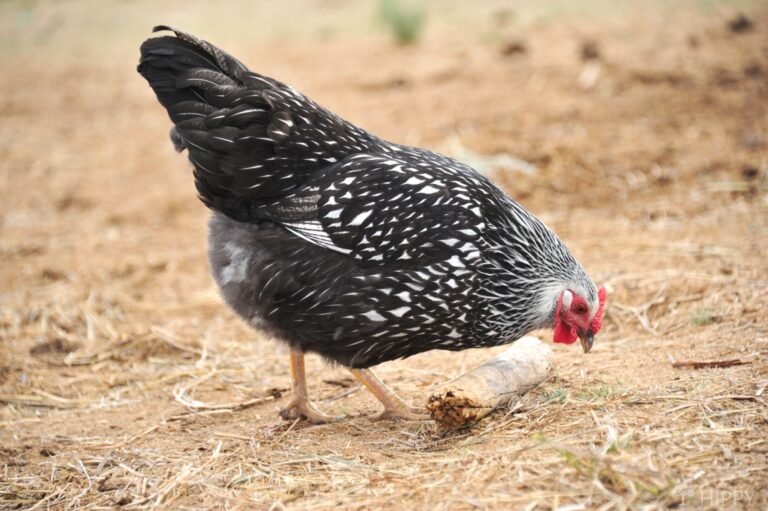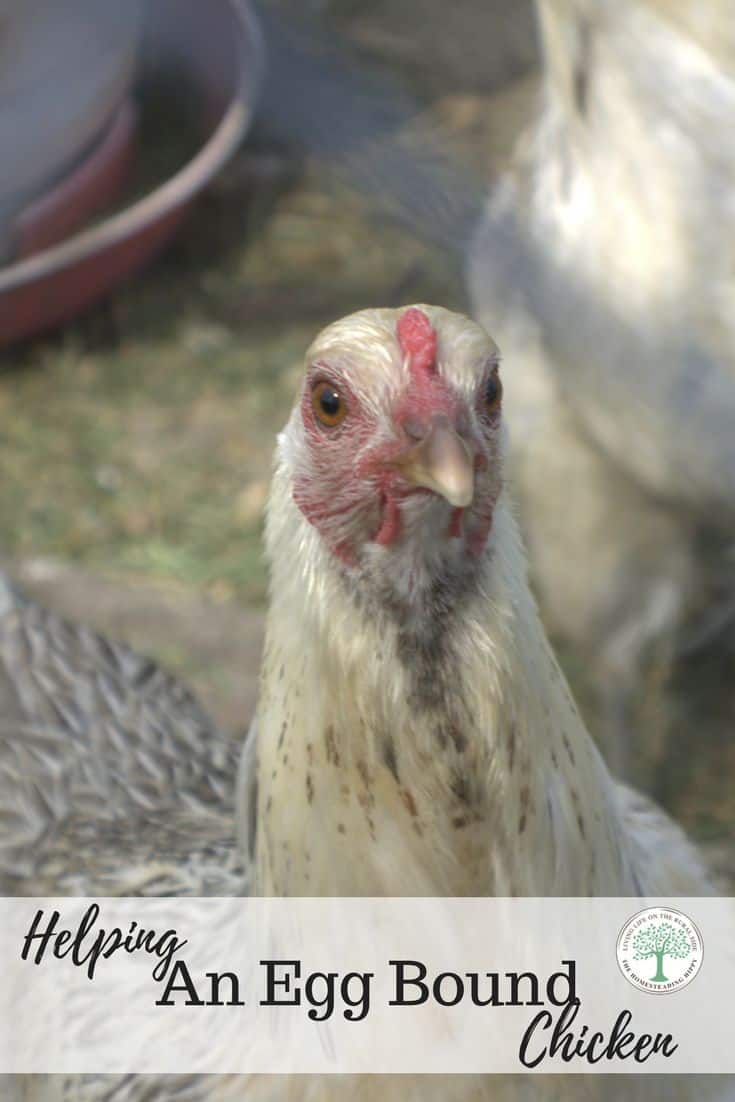As any chicken keeper knows, it’s important to keep an eye on your birds for any sign of ill health. One common problem that can affect backyard flocks is becoming egg bound. This occurs when a hen has difficulty laying an egg, and the result can be a very sick chicken.
Think you have an egg bound chicken? You will need to act quickly to help save them! Here’s some tips to get that egg to pass!

What Is an Egg Bound Chicken?
An egg-bound chicken is when a hen lays an egg, but it’s too big for their pelvis, and the egg gets stuck inside the hen.
Other reasons for laying hens becoming egg bound are:
- not enough calcium in their diet
- hen is overweight
- hen may be dehydrated
Egg binding is a serious condition that can have life-threatening consequences for chickens. It occurs when a chicken’s egg becomes stuck inside its body, preventing it from being laid. This can happen for a variety of reasons, including a lack of calcium in the diet or an abnormal pelvic anatomy.
If left untreated, egg binding can lead to dehydration, starvation, and eventually death. In addition, the egg may break inside the chicken’s body, causing infection and potentially fatal septicemia.
For these reasons, it is important to seek veterinary treatment as soon as possible if you suspect your chicken may be egg bound. With prompt medical care, most chickens will make a full recovery.
How long can an egg bound chicken live? The hen may die in 24 to 48 hours if they are unable to pass the egg.
Causes of Egg Binding
Egg binding is a condition that can afflict chickens of any age, though it is most common in older birds. The condition occurs when the hen’s oviduct becomes blocked, preventing the egg from being expelled.
There are several potential causes of egg binding, including passing very large or oddly-shaped eggs, production system malfunction, and poor quality of diet without necessary proteins, vitamins and minerals.
Obesity or laziness can also be contributing factors, as well as frequent premature egg-laying in elderly chickens with weaker muscles due to less activity. In addition, insufficient room in nest boxes can cause a hen to “hold” an egg until more room is available, which can lead to egg binding.
Reproductive tract infections and internal parasites can also be causes of this condition.
Egg binding is a serious condition that can be fatal for chickens if not treated promptly and correctly. If you suspect that your chicken may be egg bound, it is important to consult with a veterinarian as soon as possible.
In some cases, the initial cause of egg binding cannot be determined.
Symptoms of an Egg Bound Chicken
If you notice your hen showing these signs, you will want to keep a close eye on her to take appropriate action.
- repeated visits to the nest boxes, trying to lay an egg, and becoming distressed
- becoming lethargic and droopy
- not eating or drinking
- wobbling like a penguin
- vent prolapse
- premature laying
- shaky wings
- tail pumps up and down repeatedly
- diarrhea or not pooping at all
- pale face, comb, and wattles
- hard abdomen, with straining happening
Although it can be difficult, it IS possible to treat an egg bound chicken at home, successfully.
Keep in mind that egg binding and constipation present similar signs in many cases. Make sure you pay close attention and get the opinion of a vet if you aren’t sure what you’re dealing with.
Left untreated, egg retention can lead to serious illness as feces and bacteria build up.
What To Do With an Egg-bound Chicken
How do you handle an egg bound chicken? There are several different methods you can use to help your egg bound chicken pass her egg.
Some things you will need to collect and have in your chicken care kit:
- dish basin
- Epsom salt
- gloves
- lubricant, such as olive oil, or other vegetable oil
Once you have determined your hen is egg bound, you can try some different things to help them.
First, gather your kit and some warm water. If your hen is willing, you can have them sit in a warm water bath with epsom salt to help them relax. Some hens will take to this quickly and even fall asleep in their “spa”.
If they are still agitated, try gently holding them down for a few minutes to get them to relax. You can also place her in a bathroom with a steamy shower running to help her relax. This can allow the hen to more easily pass the egg.
Massage
If necessary, you can also use massage. This is done by gently rubbing her abdomen with gentle pressure.
Take care that you do not break the egg inside the hen, or the shell shards may tear her uterus. If the hen seems more agitated when you are doing massage, stop immediately. You may also be able to feel the egg inside.
Use a Lubricant
Also, applying a lubricant to her vent with a gloved finger may allow the egg to pass more easily. Allow the egg bound hen time to relax with this method, and check on her after 30-60 minutes to see if the egg has passed.
Generally, it’s not recommended to break the egg inside the hen. A ruptured egg in chicken can cause damage to her uterus.
If the egg has already broken, you will want to remove the egg shell shards as carefully as you can with a gloved finger.
Vet help may be necessary at this point to save the hen’s life. Some recommend using a turkey baster, with a saline solution, to gently wash out the oviduct to remove all shards as well.
Use Preparation H to Reduce Swelling
If you have a hen that is egg bound, you can try using Preparation H to reduce the swelling.
First, apply a small amount of the ointment to your fingertips until they are lubricated. Then, insert your finger into the vent of the hen and carefully massage the ointment into the vent area.
The goal is to help the hen pass the egg by reducing the inflammation and swelling in the area.
Encourage Her to Eat and Drink
Encourage her to eat and drink. A healthy diet will help to ensure that she has the nutrients she needs to lay her egg.
Make sure she has access to fresh water at all times, and offer her high-protein foods such as cooked chicken or hard-boiled eggs.
Isolate the Hen
If you suspect that your hen is egg bound, you need to isolate her from the rest of the flock.
This will help to prevent the spread of any potential infection and also prevent her from being bullied by the others while she is weak. Put her in a darkened crate and give her time to recover.
Administer Antibiotics
If you suspect that your hen is egg bound, you should take her to the vet to be examined. The vet will likely administer antibiotics to help clear the infection and may also need to remove the egg manually.
Worst Case Scenario – Use a Syringe or Needle to Suck the Egg Out
If your hen is egg bound, her body is unable to pass the egg. This can be a very serious condition, as the egg can become impacted in her oviduct and cause her internal organs to rupture.
In severe cases, the only way to save the hen’s life may be to perform an emergency surgery.
This is a last resort that should only be used in extreme situations.
This involves using a syringe to extract the egg from her body. While this is a last-resort option, it may be necessary to save your hen’s life.
If you find yourself in this situation, be sure to seek out professional help from a veterinarian or qualified poultry specialist.
Always keep sanitary conditions and wear a latex glove so you don’t have to worry about spreading infections.
Surgery (By a Vet)
During egg removal surgery, a vet will remove the eggs from the hen’s body.This procedure is typically successful and can help to save the hen’s life. However, it is important to note that egg removal surgery is not without risks.
There is always a risk of infection and complications associated with any surgery. As such, it is important to consult with a vet prior to having this procedure done.
Egg removal surgery is typically recommended for hens that are experiencing serious health problems as a result of egg binding.
How Will a Vet Diagnose Egg Binding?
A vet can often diagnose egg binding based on symptom presentation alone.
A hen who is egg-bound will typically show signs of distress, including lethargy, fluffed feathers, and a decreased appetite. In some cases, the hen may also stop laying eggs altogether.
If you suspect that your hen is egg-bound, it is important to take her to the vet as soon as possible.
The vet will likely perform a physical examination and take a detailed history from you. They may also recommend doing some diagnostic testing, such as x-rays or bloodwork.
Once the vet has diagnosed egg binding, they will be able to recommend treatment options. In most cases, this will involve manually removing the egg or giving the hen medication to help her pass the egg. With prompt treatment, most hens make a full recovery.
How To Prevent Egg Binding
Fortunately, you can prevent egg binding. Some tips to help prevent an egg bound chicken…
Proper Nutrition
Proper nutrition, with calcium supplements like oyster shells (get them here) and plenty of Vitamin D (sunshine) are important. Calcium deficiency and overall malnutrition is a common cause of this condition.
A hen’s diet is critical to her overall health and well-being, and it is important to ensure that she has access to all the nutrients she needs in order to lay healthy eggs.
One essential nutrient is calcium, which plays a role in bone and egg development. If a hen does not get enough calcium, she may develop a condition known as egg binding, where the egg becomes stuck in the oviduct and cannot be laid.
Egg binding can be painful and potentially fatal for the hen, so it is important to take steps to prevent it. One way to do this is to provide a separate calcium supplement in a feeder, so that the hens can consume it at their own pace. This will help to ensure that they are getting the calcium they need without overfeeding them, which can also lead to health problems.
Allow for Exercise
Make sure your hen has plenty of room to exercise, and move about to avoid becoming too overweight. Allow as much freedom and room as you can.
Lots of Water
Ensure your entire flock has plenty of clean water at all times, to avoid dehydration.
Cull Prone Individuals
Some hens become egg bound due to genetics. Egg binding can be passed down between generations, and there is little you can do about those besides cull those with those specific traits.
Reduce Light Exposure
One way to help prevent egg bound is to reduce the amount of light exposure for your hens. Hens need 14-16 hours of light each day to stimulate egg production.
However, too much light can disrupt the normal reproductive cycle and lead to egg bound. If you think your hen may be egg bound, reduce her light exposure and provide her with plenty of rest and water.
Try Hormone Therapy
One way to prevent egg bound hen is to try hormone therapy. This treatment can help the chicken to develop more eggs and to produce more eggs of a larger size. In addition, hormone therapy can help to improve the health of the chicken’s reproductive system.
As a result, this treatment can help to reduce the risk of egg bound hen. While hormone therapy is not a cure-all, it can be an effective way to prevent egg bound hen in chickens.
Make Sure the Feed is Mold-Free
One way to help prevent egg binding is to make sure that the feed is mold-free. Mold can produce a toxin that can interfere with calcium absorption, making it more likely for an egg to become stuck.
Additionally, moldy feed can also lead to other health problems, such as respiratory infections. As a result, it is important to inspect the feed regularly and discard any that shows signs of mold growth.
Provide Enough Nest Boxes
In some cases, egg binding can be prevented by providing enough nest boxes. By having more nest boxes available, hens are less likely to have to queue up to lay their eggs. This prevents them from becoming too stressed, which can contribute to egg binding.
Additionally, providing enough nest boxes will give hens more space to move around, making it less likely that they will become stuck in one position and unable to lay their eggs.
Monitor the Health of Older Hens
Older hens lay eggs less frequently, so it’s a good idea to monitor their health. Make sure your older girls have the nutrients they need and are not too skinny or overweight.
Take Care of Parasite Infestations
Parasite infestations are a common problem for backyard chicken keepers. Not only can parasites cause health problems for your chickens, but they can also lead to a condition known as egg binding.
Egg binding occurs when a hen is unable to lay her egg due to an obstruction in the oviduct. This can be caused by a build-up of mucus, an abnormal egg, or a parasite.
To prevent parasites it is important to maintain good hygiene in your coop and run. This means regularly cleaning out the chicken coop and removing any potential sources of parasites, such as rodents. Second, provide your hens with plenty of fresh food and water.
A healthy diet will help to boost their immune system and reduce the risk of parasite infestation.
Finally, keep an eye out for signs of parasites, such as unusual behavior or weight loss. IF you notice signs of a parasite infestation, you’ll need to treat worms immediately.
Final Thoughts
Making sure your flock has proper nutrition, with food not being higher than 18% protein, calcium supplements and plenty of water will go a long way toward preventing issues.
Have you experienced an egg bound chicken? What did you do to help her? Be sure to share in the comments, and pin this for later!


Heather’s homesteading journey started in 2006, with baby steps: first, she got a few raised beds, some chickens, and rabbits. Over the years, she amassed a wealth of homesteading knowledge, knowledge that you can find in the articles of this blog.
Learn more about Heather and the rest of the writers on this page.

This is very good .
I currently have what I think is an eggbound hen. Yesterday, I noticed her walking “like a penguin”, while the day before she was completely fine! She seemed swollen in her lower abdomen to her vent. I brought her into the house, ran her a warm bath, and put her in it. She seemed to really like the warm water and just stayed in it without a fuss. While in the water, I massaged her abdomen and cleaned her vent area of a little poop that was there. She actually stayed in the water for about 30 min. Then I gently wrapped her in a towel to dry her. She didn’t even try to get out of the towel. I think she knew I was trying to help.
I put her on a table and while she sat there all wrapped up, I warmed a little olive oil and got a disposable soft syringe/squeeze bulb. I put some of the olive oil into her vent to help lubricate. Tried a little more massage. I really can’t feel an egg, so I don’t know if it should be obvious? Then I got her a small kennel with shavings and a heat pad under it so she could sleep comfortably for the night.
So now it is Friday (Wed fine, Thurs noticed penguin walk), and she still hasn’t improved. I tried massage again. But all day, still no egg or sign of anything passing. She’s still “swollen”.
At this point, it’s now Friday night and I decided to give her antibiotics in hopes that she doesn’t develop an infection from this. We have good chicken vets in this area, but they aren’t available on the weekend. I’m just hoping she makes it to Monday when the vets open.
This is a 3 year old brown leghorn. She’s a gorgeous hen and one of my husband’s favorites in our multi-breed flock.
So this is my experience right now.
I also went through this about 3 years ago with another hen. Did the same thing: warm bath, olive oil, and she passed the egg within in a few hours. Just not happening this time (sigh).